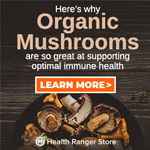Medical professor diagnosed with multiple sclerosis miraculously cures debilitating disease through dietary and lifestyle changes
Thursday, July 07, 2016 by: David Gutierrez, staff writer
Tags: multiple sclerosis, natural cures, George Jelinek

(NaturalNews) When emergency medicine professor George Jelinek was diagnosed with multiple sclerosis (MS) at age 45, he was told the disease was progressive and incurable. He had reason to believe it; he had seen his own mother suffer from the disease until she needed a wheelchair to get around, until, eventually, she took her own life.
But, rather than accepting the diagnosis, Jelinek dived into researching what the scientific evidence actually said about MS. To his shock, he discovered that a rigorous program of lifestyle changes could halt and even reverse the progress of the disease.
Seventeen years later, he says he has "'no symptoms — I'm perfectly well."
"I'm actually fitter and healthier than I have been at any time in my life," said Jelinek, who runs and swims regularly.
Numerous studies have since backed Jelinek's program up, which is explained in detail in his book, Overcoming Multiple Sclerosis: An Evidence Based Guide to Recovery.
Lifestyle change cures 'incurable' disease
MS occurs when the immune system attacks the myelin sheath surrounding nerve cells, causing a slowing of the nerve signals between the brain and the rest of the body. The disease is characterized by a wide range of neurological symptoms, including muscle stiffness and spasms, and loss of control over bodily functions. Although the disease itself is rarely fatal, it can lead to complications – such as infections – that can be deadly.The doctor who diagnosed Jelinek repeated the conventional wisdom: there is no way to prevent the progression of MS.
"It was, 'Look, buddy, I've got terrible news. You've got this incurable progressive neurological disease and there's nothing you can do about it'," Jelinek recalled.
But Jelinek did not take his doctor's word for it. Instead, he began to pore over the medical research, uncovering obscure and overlooked studies from as far back as the 1930s. He also formed an international network of MS patients that has now grown to 16,000.
Based on his research, Jelinek put together a program of lifestyle changes backed by the evidence. He decided to test the program on himself, and promoted it to the members of his MS community.
"It took years for the symptoms to disappear," he said. "It was gradual, but seven years after diagnosis I realised I no longer had them."
"And we have found age doesn't matter, nor does it matter how disabled you are — it's possible to stabilise the illness at any stage."
Five simple steps
The five components of Jelinek's program are:1. Diet. The program calls for patients to stop eating meat, dairy and any foods high in saturated fat, and to instead eat a plant-based diet supplemented with seafood and an extra 20–40 mL of omega-3s per day, preferably in the form of flaxseed oil. Supplementation with B-vitamins may also be needed for some patients.
2. Exercise. Patients should be sure to get 20–30 minutes of exercise per day, five days per week, preferably outdoors.
3. Sunlight/Vitamin D. Light-skinned patients should get 15 minutes of sunlight (without sunscreen) five times a week; darker-skinned patients may need more. Patients should also take a vitamin D supplement of 5,000–10,000 IU daily, as needed to bring blood levels up to 150–225nmol/L.
4. Meditation. Patients should meditate for 30 minutes per day. Like all the other components of the plan, the benefits of meditation have been proven through numerous scientific studies.
5. Medication. In contrast with conventional MS treatments, Jelinek's plan saves pharmaceuticals for a last resort. The plan cautions patients and doctors to weigh the benefits of drugs against the side effects, and to use them only in serious cases. For such cases, however, the plan calls for careful adherence to prescribed medication.
The program is also recommended for close relatives of MS patients, who are at elevated risk of developing the disease. Following the program may actually help prevent the disease in the first place.
Of course, these steps can benefit everyone, not just those seeking to treat or prevent MS. And a great way to boost your diet is with superfoods such as clean, organic chlorella.
Sources for this article include:
DailyMail.co.uk
OvercomingMS.org
OvercomingMS.org
Amazon.com
OrganicChlorella.NaturalNews.com
Science.NaturalNews.com
Multiple sclerosis at FETCH.news
Get independent news alerts on natural cures, food lab tests, cannabis medicine, science, robotics, drones, privacy and more.
Take Action: Support Natural News by linking to this article from your website
Permalink to this article:
Embed article link: (copy HTML code below):
Reprinting this article:
Non-commercial use OK, cite NaturalNews.com with clickable link.
Follow Natural News on Facebook, Twitter, Google Plus, and Pinterest
- Newly released JFK files reveal Pentagon's role in creating Lyme disease and covid in the same lab
- Kiss Your Genetic Privacy Good-Bye! 23andMe Gets Green Light to Sell Your Intimate Genetic Details to Anyone They Want
- Sugar-free deception: Artificial sweeteners hijack hunger signals, fuel obesity epidemic, study warns
- Discovery of vast underground city beneath Giza pyramids challenges human history
- Black cumin seed oil emerges as a powerful ally against breast cancer and chronic inflammation
- Dr. Suzanne Humphries makes bombshell appearance on Joe Rogan podcast, exposing vaccine industry deception back to POLIOMYELITIS
- Sweden's migrant crisis deepens as failed green energy venture leaves thousands jobless, exposes systemic collapse
- Analysis: The coming economic collapse, a mass uprising and Trump's three secret weapons to halt the growing revolt
- Is the vaccine-autism debate reopening? Washington Post sparks controversy with preemptive hit piece on David Geier
- A handful of pecans a day could keep heart disease at bay, study finds
- Challenging the status quo: “America Fooled” by Timothy Scott exposes the myths about antidepressants
- RFK Jr. slashes HHS bureaucracy, saves taxpayers $1.8B while refocusing on chronic disease epidemic
- AI breakthrough slashes celiac disease diagnosis time from months to minutes
- Woman contracts WORLD'S DEADLIEST VIRUS after unknowingly being given the WRONG VACCINE
- Pediatric dentist exposes fluoride dangers as more states ban toxic water additive
- Aluminum pollution: A silent threat to human health
- Cauliflower: From ancient crop to modern superfood
- Catastrophic 7.7 earthquake devastates Myanmar and Thailand; death toll could reach 100,000
- Newly released JFK files reveal Pentagon's role in creating Lyme disease and covid in the same lab
- Analysis: The coming economic collapse, a mass uprising and Trump's three secret weapons to halt the growing revolt
- Trump nominates VACCINE ZEALOT Susan Monarez to lead the CDC, sidelining RFK Jr.'s reform efforts
- Trump's greatest betrayal so far: Accelerating Middle East wars, silencing dissent, and serving Zionist masters
- Dr. Mike Yeadon releases 15-minute testimony - WATCH - about genocidal intent of COVID “vaccines”
- Festive flavors: The sweet history, nutritional profile and health benefits of pecan pie
- Elon Musk: Aliens could be here on Earth RIGHT NOW
- Big Pharma's $8 Billion bribery scheme exposed: how doctors are pushed to prescribe junk science, not heal
- 5 Simple steps to boost your brainpower: How to strengthen executive function in a distracted world
- Trump reverses course on Gaza plan, says “nobody is expelling Palestinians”
- A lack of integrity in Academia: Harvard professor found GUILTY of fraudulent research to promote CRT theory
- Reclaim your health: How midlife exercise reverses years of inactivity
- Survival 101: Effective EMF blocking techniques
- Florida takes a stand: DeSantis proposes permanent ban on mRNA vaccine mandates
- Sugarcane extract superior to cholesterol-lowering drugs?
- California's social media censorship law struck down: A victory for free speech or a threat to online safety?
- OpenAI whistleblower who dissented against how the company trained ChatGPT found dead
- EPA advisor admits the agency is funneling billions to climate groups ahead of Trump’s return to White House
- EPA advisor admits the agency is funneling billions to climate groups ahead of Trump’s return to White House
- Newly released JFK files reveal Pentagon's role in creating Lyme disease and covid in the same lab
- California's social media censorship law struck down: A victory for free speech or a threat to online safety?
- Dr. Mike Yeadon releases 15-minute testimony - WATCH - about genocidal intent of COVID “vaccines”
- The Health Ranger releases “Vaccine Zombie” song and music video, using AI-animated zombies for the music video
- The pandemic as a tool for INDOCTRINATION: Understanding “The Indoctrinated Brain” by Dr. Michael Nehls
- Florida takes a stand: DeSantis proposes permanent ban on mRNA vaccine mandates
- “Why we influenced the 2020 elections”: Facebook files reveal the coordinated effort to bury the Hunter Biden laptop story
- Mike Adams releases country western hit single: Goin’ Back in Time is Comin’ Home
- Mike Adams releases music poetry sensation: A Child of God
- Unpacking the Lies That We’ve Been Fed – new song and music video released by Mike Adams, the Health Ranger
- Michigan sheriff announces criminal investigation into 2020 election crimes, Dominion Voting Systems
- Migrants are taking advantage of recent hurricanes to scam residents and loot their homes
- House Intelligence Committee calls for the ARREST and PROSECUTION of Dr. Anthony Fauci
- RFK Jr. clears key hurdle: Sen. Susan Collins backs controversial HHS nominee, signaling a new era for health policy
- Rep. Nancy Mace introduces bill to ban biological males from female facilities on federal property
- Peter Rost exposes Big Pharma corruption in his book “The Whistleblower: Confessions of a Healthcare Hitman”
- Mike Adams releases new song and music video: Nothing More Disgusting Than a Globalist
- Red Cross issues warning to stop blood plasma donations from vaccinated people
- Scientists confirm: GENIUS brain function can be spontaneously unleashed in humans without any apparent cause
- EPA advisor admits the agency is funneling billions to climate groups ahead of Trump’s return to White House
- HYSSOP: What research reveals about the health benefits of this ancient holy herb
- Two containers with completed ballots fall out of truck in Florida
- Fully vaccinated about to see “tsunami” of illness and death, warns virologist
- Global leaders unite to clamp down on “misinformation” with UN-backed Cascais Declaration
- BREAKING: 2025 NDAA authorizes mandatory military draft of WOMEN across America… as Pentagon pursues global NUCLEAR war with both Russia and China at the same time
- Michael Yon warns of a ZIONIST TAKEOVER in Trump’s second administration
- BOMBSHELL: DNA testing kits are a SCAM to develop ethnic-specific bioweapons
- Ozempic and Wegovy weight loss drugs are injectable LIZARD VENOM PEPTIDES that may unleash a devastating wave of organ failure… side effects align with symptoms of SNAKE BITES
- Israeli soldiers accused of even more torture and abuse in the West Bank
- These 13 countries just signed an agreement to engineer a global FAMINE by destroying food supply
- NASA admits that climate change occurs because of changes in Earth’s solar orbit, and NOT because of SUVs and fossil fuels
- RFK Jr. clears key hurdle: Sen. Susan Collins backs controversial HHS nominee, signaling a new era for health policy
- Sermon 30: How Jesus reveals Caesar’s FAKE CURRENCY and FALSE AUTHORITY
- Coriander seeds: Ancient medicine backed by modern science
- Arizona officials claim Maricopa County needs 10-13 days to tabulate results of the election
Science News & Studies
Medicine News and Information
Food News & Studies
Health News & Studies
Herbs News & Information
Pollution News & Studies
Cancer News & Studies
Climate News & Studies
Survival News & Information
Gear News & Information
News covering technology, stocks, hackers, and more



"Big Tech and mainstream media are constantly trying to silence the independent voices that dare to bring you the truth about toxic food ingredients, dangerous medications and the failed, fraudulent science of the profit-driven medical establishment.
Email is one of the best ways to make sure you stay informed, without the censorship of the tech giants (Google, Apple, Facebook, Twitter, YouTube, etc.). Stay informed and you'll even likely learn information that may help save your own life."
–The Health Ranger, Mike Adams












































